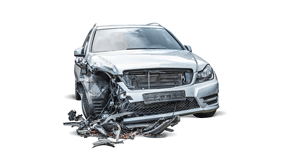Who is liable for vehicle damage in car parks?

Damage to one's own vehicle is always annoying - and not infrequently an enormous financial burden for the owner. But who is actually liable for damage that occurs in a parking lot? Whether in the supermarket parking lot, when loading and unloading in a private parking space or in a rented parking lot during a vacation trip - there are many ways to park your car, motorcycle & Co. while they are not in use.
In order to clarify the question of a liability claim, a few key data must first be determined, because different legal principles apply depending on the parking area and the circumstances of the accident. We would like to give you a rough overview - without claiming to be complete - because in case of doubt, a court decision is usually made even in the case of parking lot accidents.
What liability damages can occur in parking lots?
There are various ways in which vehicle damage can occur in parking lots. The most typical are probably accidents when parking or backing out of a parking space - with damage to the driver's own car or another vehicle. But rear-end collisions while looking for a parking space or leaving the lot are also not uncommon. If the parking spaces are particularly tightly marked, property damage can also occur when the vehicle door is opened. Damage is particularly annoying if it is caused by inadequate traffic safety in the parking area or by intent. But even in these cases, the question of liability is not as easy to resolve as it seems.
Basic differences between public and private parking lots
A public parking space is always defined as one that is freely accessible to all road users, even if they have to pay for it. This can be a free supermarket parking lot or a parking bay at the side of the road, as well as a paid parking garage or other parking area. In these cases, the StVO always applies when it comes to right of way and other traffic regulations.
In a private or company parking lot, on the other hand, the situation may be different. For example, the parking lot operator can give priority to certain vehicles, change the right of way, or specify other measures such as walking speed. If this is not the case, the StVO applies here as well.
Liability issues in the parking lot - three case studies
We would like to give you three brief examples where the question of liability has been settled in court:
1. parking garage: falling plaster causes paint damage and dents on a vehicle
A vehicle owner had parked his car in a paid parking garage. When he went to pick it up again, it had been damaged by crumbling plaster. The court ruled that the operator of the parking garage had to pay for the damage because he had not fulfilled his duty to ensure road safety. This means, for example, that he must regularly check the walls and ceilings for stability.
2. public parking: damage caused by opening the door in the parking space
In another case, the passenger caused damage to another vehicle while opening his door. The special feature here: The driver of the damaged vehicle had just entered the adjacent parking bay. The judge therefore ruled that both parties were partly to blame. The reason: On the one hand, the person opening the door must make sure that he can open his door without danger. On the other hand, the person parking must act with particular caution if there are still people in the neighboring vehicle and always anticipate the possibility that the doors could be opened.
3. private parking: accident with changed traffic routing
The right-of-way rules of the StVO do not necessarily apply to private parking lots - the parking lot operator has his own decision-making leeway here. This is what happened in another case: The private parking lot was used by both cars and trucks, whereby the operator had established a special right of way for trucks. At an intersection, a truck coming from the left and a car coming from the right collided. Since the car driver had not paid attention to the changed right of way and had thus taken the right of way from the truck driver, the liability and thus the settlement of the damage lay clearly with him.
Notes on liability for vehicle damage in McParking parking lots
The parking areas of McParking are considered public parking spaces that can be used by any road user against payment. Therefore, the regulations of the StVO also apply here - without exception. If there is damage to your or another's vehicle, please inform our parking personnel briefly and then the police so that the damage can be recorded if necessary. If no report is made in the case of damage caused by you, this is considered a hit-and-run and can be punished with high fines - even for a small scratch.
McParking as parking lot operator is only liable if damage was caused by gross negligence or intentionally by our own personnel or corresponding vicarious agents. In case of burglary, theft or damage by third parties to your vehicle, liability by McParking is excluded. For more information, please refer to our General Terms and Conditions.



